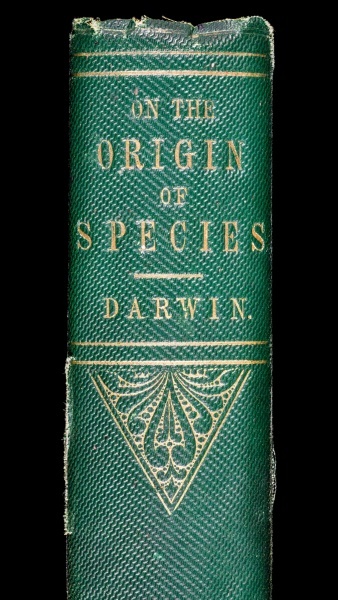Darwin: On the Origin of Species
It is difficult to identify an aspect of daily life or a scientific discipline that has not been impacted by Charles Darwin’s theory of evolution, as formulated in On the Origin of Species: By Means of Natural Selection, or the Preservation of Favoured Races in the Struggle for Life. Darwin amassed a wealth of empirical evidence to support evolutionary theory. This is one reason that he instead of Alfred Russel Wallace is the first to be given credit for evolutionary theory.
Further, Darwin provides us a model of how to “do” good science, instructing scientists in diverse disciplines about how to investigate complex relationships. With this in mind, Darwin was well aware of the widespread impact his Origin would have. For example, on the final page of the Origin, he anticipates that there will be applications of key components of evolutionary theory, such as variation and adaptation as a means of survival, to investigations in the behavioral and physical sciences:
In the distant future I see open fields for more important researches. Psychology will be based on a new foundation, that of the necessary acquirement of each mental power and capacity by gradation. (p. 488)
William James and James Rowland Angell, leading psychologists at the dawn of the twentieth century, were eager to incorporate evolutionary theory into their explanations of the phenomena of mental life. James, of Harvard, anticipated the psychological perspective of functionalism and was particularly inspired by the Origin. He and Angell, who worked at the University of Chicago, interpreted intelligence, learning, and emotion in the context of adaptation and mental survival in a “precarious environment.”
Emotions, for example, are pragmatic and adaptive. According to James, you are more likely to survive if, when seeing a bear, you run and only then label the rapid heart rate and respiration you experienced when seeing the bear as fear. If you stop to label the emotion before running, you may not survive to experience that emotion again. The James-Lange theory of emotions, the first accepted psychological theory of I 2 emotions, likely owes its inspiration to Darwin.
Overall, Darwin’s influence on psychology through his publication of the Origin was similar to that on the natural sciences: It expanded methods of doing research. In addition, the Origin broadened the base of interests for psychology and the applications of results to human development and mental health. The growth and popularity of comparative psychology— the study of animals to learn about human behavior—signals an obvious impact; another was the development of the field of evolutionary psychology. In the latter case, evolutionary processes are believed to shape not only the body, but also the brain, brain processes, and behaviors as psychological adaptations for problem solving. These contribute to survival as well as reproduction, such as in mate selection.
Of less obvious impact was a shift of focus from the drive to identify generalities in human behavior to the importance of individual differences and the role of intelligence and human traits that make some people more successful than others in adaptation and creativity.
Thus, Darwin’s Origin has been an impetus to the sciences as well as a legacy to generations who have been and are yet to be inspired to systematic investigation and creative thought. It contains views about evolution that offer persuasive and powerful explanations for biological as well as mental adaptation and growth. As important is its value as an exemplar of data meticulously presented in support of well-conceived arguments, couched in writing that can engage scientists and non-scientists alike.
—Susan Davis, PhD, Associate Professor, Psychology

